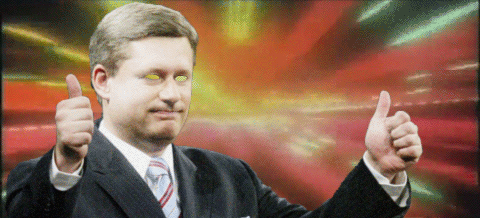A Minor Meighen Majority
Fresh off his majority win in 2009, Andre Bachand was finally able to govern on his own, without the support of the now very weak Reform party, and set his government firmly in the centre-right. In press conferences, Bachand frequently spoke of his government focusing on the “
common sense solutions,” and as a result his majority term was far less ideological than his minority term. Indeed, compared preceding Conservative Prime Ministers, Bachand was the most moderate in decades. While this made Bachand friends (the historically National Liberal-dominated civil service got along quite well with his government, and he looked set to make gains among formerly National Liberal and New Alliance voters) it also made him enemies, as the right-wing of his party began to grumble about his leadership.
While these grumblings were initially private, things went sour for Bachand in 2011, as a moderate budget from Finance minister Jim Flaherty, moderate enough to result in National Liberal leader Martha Hall Findlay admitting she agreed with most of its contents, led to public criticism from the right-wing of his caucus. A group of MPs, led by backbencher Dick Harris, publicly denounced the budget as “
a liberal budget from a Conservative Prime Minister,” and used the opportunity to criticize several other of Bachand’s more centrist policies. Soon enough, these MPs (11 in total) announced that they were crossing the floor to join the Reform party, under new leader Danielle Smith, giving the party official status in the House of Commons and nearly vaulting it ahead of the NDP.
While these defections were not enough to defeat the government’s budget (and thus send Canada to the polls), they proved very damaging to Bachand. Polling after this incident showed that while the National Liberals remained stable, a large amount of support had shifted from the Conservatives to Reform, causing the Conservatives, once 2-points ahead of the National Liberals, now trailing badly.
When the polling slump continued on into Summer 2011, pressured by his caucus, cabinet, and the party executive, Bachand was forced to take drastic action, which some will later say did more long-term harm than good. In a shocking move, Bachand dismissed several of his most centrist cabinet ministers, most notably Belinda Stronach, Scott Brison, and John Herron, replacing them with more right-wing choices. While Bachand’s gambit had a minor success in terms of its goals (some of the defecting MPs rejoined the party, while Reform polling numbers slipped), by placating one wing of his party he alienated the other. The dismissed cabinet ministers were shocked, and told the media that they had no prior warning they were going to be removed from their posts, while Brison criticized Bachand for “
appealing to a fringe.” By the end of the year, Brison and Stronach would end up joining the National Liberal party.
A year later though, going into the election, Bachand had reason to be optimistic. The Conservatives had remained tied with, if not narrowly in the lead of, the National Liberals for most of the year, and Bachand thought that a good campaign could lead to a second majority government. It initially looked like that would be the case, with Hall Findlay failing to provide a clear reason to not vote for the government, with Conservatives frequently airing ads using Hall Findlay’s past praise of their budget. After a couple of weeks in, though, the tide turned for the National Liberals, as the campaign decided to give a prominent focus to Stronach and Brison, despite initial fears that this would annoy the National Liberal base. Instead, the two proved to be a powerful critic of their former party, saying that “
this government isn’t what it was four years ago.” The gambit began to pay off, and the National Liberals began eating into the Conservative lead.

However, as beneficial as Stronach and Brison were to the Nat Libs, the Conservatives were still able to win another term – but only barely. Coming in just four seats and 0.2 percentage points ahead of the National Liberals, and with a stronger New Alliance and Reform party, Bachand looked set for a rocky third term.
Prime Ministers of Canada:
William Lyon Mackenzie King (Liberal) 1921-1925
Arthur Meighen (Conservative) 1925-1933
Charles Avery Dunning (Liberal) 1933-1939
James Garfield Gardiner (National Liberal) 1939-1953
Brooke Claxton (National Liberal) 1953-1957
Howard Charles Green (Conservative) 1957-1965
James Sinclair (National Liberal) 1965-1973
Alan Eagleson (Conservative) 1973-1980
Jack Horner (Conservative) 1980
Pierre Trudeau (National Liberal) 1980-1984
Jack Horner (Conservative) 1984-1986
Pierre Trudeau (National Liberal) 1986-1987
Jack Horner (Conservative) 1987-1994
Bob Kaplan (National Liberal) 1994-2001
Allan Rock (National Liberal) 2001-2006
Andre Bachand (Conservative) 2006-present
A Minor Meighen Majority
Canadian Federal Election 1925
Canadian Federal Election 1929
Canadian Federal Election 1933
Canadian Federal Election 1937
Canadian Federal Election 1940
Canadian Federal Election 1945
Canadian Federal Election 1950
Canadian Federal Election 1955
Canadian Federal Election 1957
Canadian Federal Election 1958
Canadian Federal Election 1961
Canadian Federal Election 1965
Canadian Federal Election 1967
Canadian Federal Election 1969
Canadian Federal Election 1973
Canadian Federal Election 1977
Canadian Federal Election 1980
Canadian Federal Election 1984
Canadian Federal Election 1986
Canadian Federal Election 1987
Pierre Trudeau
Canadian Federal Election 1989
Canadian Federal Election 1994
Jack Horner
Canadian Federal Election 1998
Canadian Federal Election 2002
Bob Kaplan
Canadian Federal Election 2006
Allan Rock
Canadian Federal Election 2009


